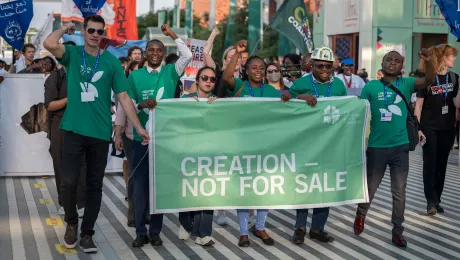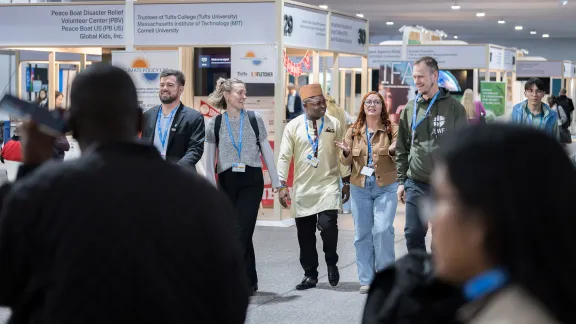
LWF delegates to the United Nations climate summit COP29 taking place in Baku, Azerbaijan. Photo: LWF/Albin Hillert
LWF delegates reflect on climate and their journeys of faith
(LWI) - The United Nations climate summit COP29 continues, and both onsite and online, The Lutheran World Federation (LWF) delegates keep the focus on amplifying the call for climate justice.
As negotiations moved past their halfway point in Baku, a group of young LWF delegates reflected on their own journey and how they sustain hope for a climate just future, even in face of a crisis that concerns every living being on the planet.
The LWF delegation includes young people from member churches around the globe, church leaders, representatives of the LWF Climate Justice taskforce, and staff from World Service country programs.
“COP29 is more than just a conference. It is a call for urgent action to protect creation,” says Nathaly Quito, national coordinator for climate justice projects at the Evangelical Lutheran Church of Colombia.
As a young Lutheran Christian, she describes the relationship between faith and hope as fundamental: “The promise of salvation is not only for us as humans, but for all forms of life, and therefore it’s important that we make every effort necessary to protect all of Creation.”
‘Capacity to imagine change’ vital
“Our presence at COP gives young people a unique opportunity to consider climate justice alongside their spirituality – both the parts of ourselves that want to call for policy change, and the parts that are singing songs in worship – and to say that all of who you are is important here, all of who you are is welcome here, and needed for this movement,” says Savanna Sullivan, LWF program executive for youth, who co-leads the LWF delegation.
Our presence at COP gives young people a unique opportunity to consider climate justice alongside their spirituality – both the parts of ourselves that want to call for policy change, and the parts that are singing songs in worship
Savanna Sullivan, LWF Program Executive for Youth
What young people bring to the COP extends beyond mere ‘youthful energy’, Sullivan stresses: “One of the strengths young people in particular bring to the table is the capacity to really reimagine and envision a different world, even when things may seem difficult or even hopeless. The world’s biggest problem requires the world’s most creative answers. Young people bring that creativity.”
“Our hope in this movement comes from God, and we share that with the world,” she adds.
Sustaining hope as faith communities working for climate
“Climate justice is about intergenerational justice, human rights, gender justice, my own community, my own future, my own hope,” says Maro Micah Maua from the Kenya Evangelical Lutheran Church, who this year joins the COP29 as a delegate for ACT Alliance.
Attending his third COP, Maua says this year’s conference must reaffirm “that vulnerable communities need to be supported, their livelihoods maintained, no one dies of hunger, no one is a victim of the severe impacts of climate change.”
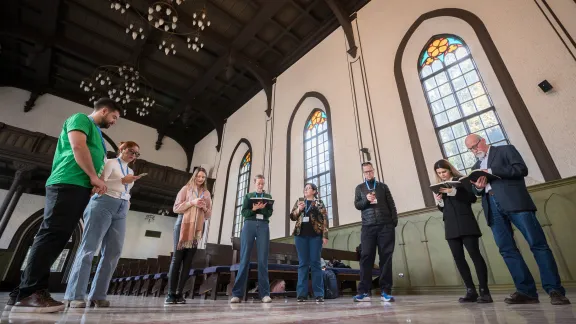
LWF delegates to COP29 gather for a moment of prayer at the Evangelical Lutheran Church in Georgia, Baku congregation. Photo: LWF/Albin Hillert
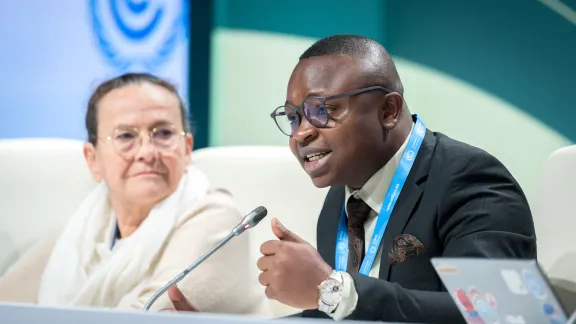
Maro Micah Maua of the Kenya Evangelical Lutheran Church pictured during an interfaith press conference at COP29. Photo: LWF/Albin Hillert
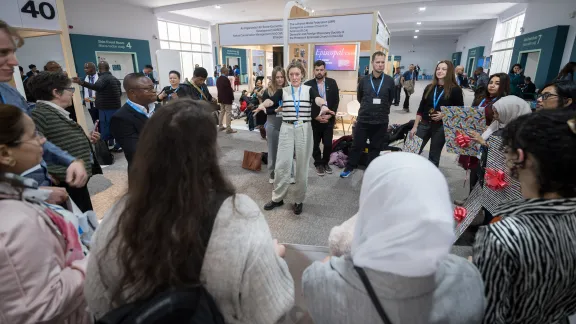
Savanna Sullivan leads preparations for an advocacy action by ecumenical and interfaith partners at COP29 in Baku, Azerbaijan. Photo: LWF/Albin Hillert
Another young Lutheran leader, Christine Moffett, is attending COP29 in her capacity as Program Director for Environment and Energy Policy at the Evangelical Lutheran Church in America.
Considered to be ‘a finance COP’, COP29 is aimed at establishing solid mechanisms for financing of climate solutions around the globe yet opinions on how to achieve this should have proven notoriously difficult to resolve. For Moffett, the importance of acknowledging interconnectedness stands out as key.
“If we all realize … climate is going to affect all of us, then I think we’ll be able to realize the ambition and the contribution that each of us should bring to the table here,” she says.
Alongside the intense negotiations by governments, “the faith community is here to provide accountability, but really to provide hope in the process, of working toward climate justice and a world where God’s creation is protected and preserved,” she adds.
But hope is not an isolated concept as Quito from Colombia reflects. “Hope is something that we build every day. And though we also depend on high-level decisions, hope resides in the many small actions that we undertake together with local communities, with farmers, with indigenous people, with women and children, and all those committed to caring for creation.”
She touches on a core dimension to the long-term approach of LWF’s climate justice work, described by the delegation co-lead and Program Executive for Climate Justice Elena Cedillo : Advocating for climate justice, Cedillo says, involves understanding the technicalities of climate negotiations, and that decisions made at the UN conference “are not just words on paper:- they must be translated into actions that meet the needs of local communities and the LWF has a unique strength in bringing the realities of those most affected into global climate policy discussions.”
Participating in the COP is LWF’s long-term commitment to raising awareness, inspiring action and leading by example,” Cedillo says. She emphasizes the delegates’ continuing work of “running campaigns, inspiring your community and motivating church leaders” when they return home.
Cedillo concludes: “Young people inspire others to act for climate justice, but this responsibility belongs to every generation. Together, we must stand as committed stewards of creation, united for the good of our common home.”
The LWF delegation to COP29 comprises church leaders—men, women and youth—from all continents, advocating for the most vulnerable people from a faith perspective. They join efforts with ecumenical and interfaith partners in online and face-to-face meetings.
